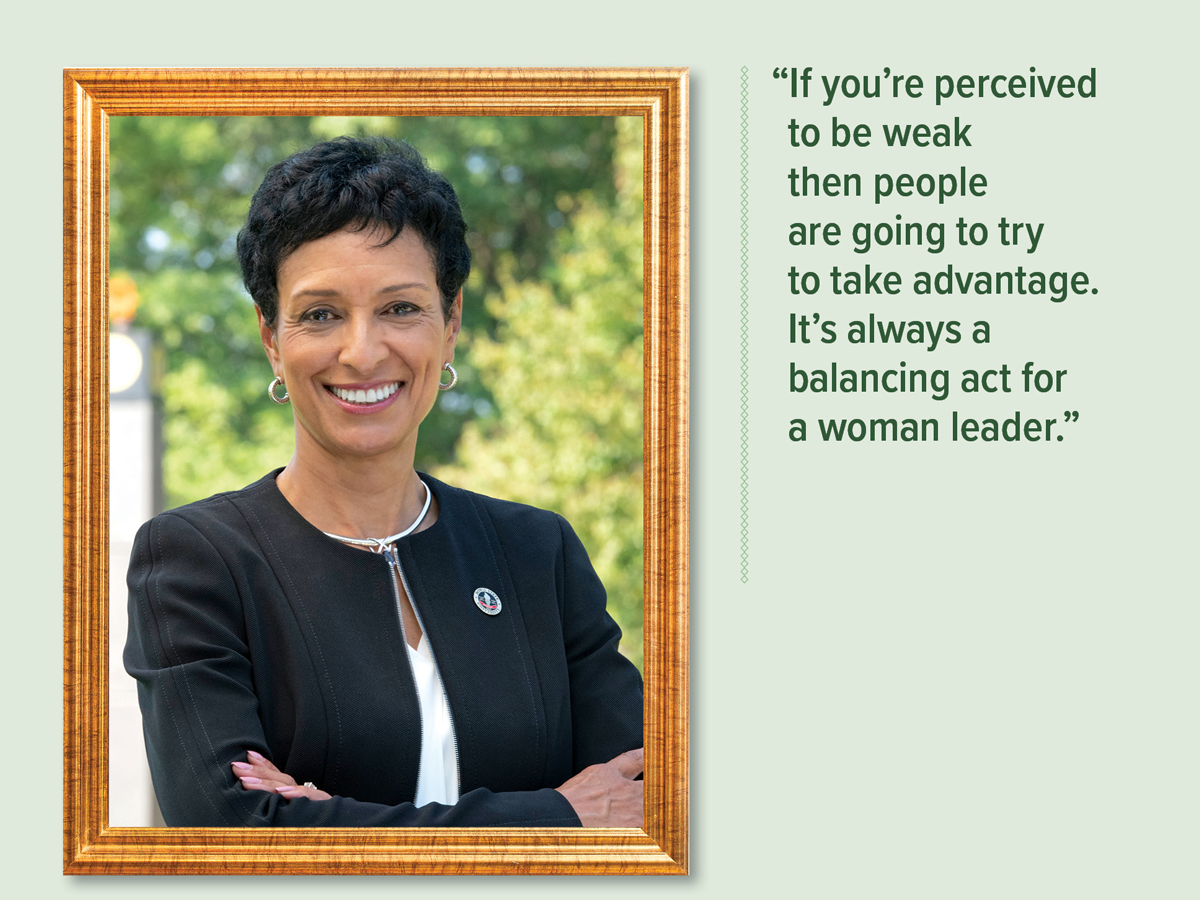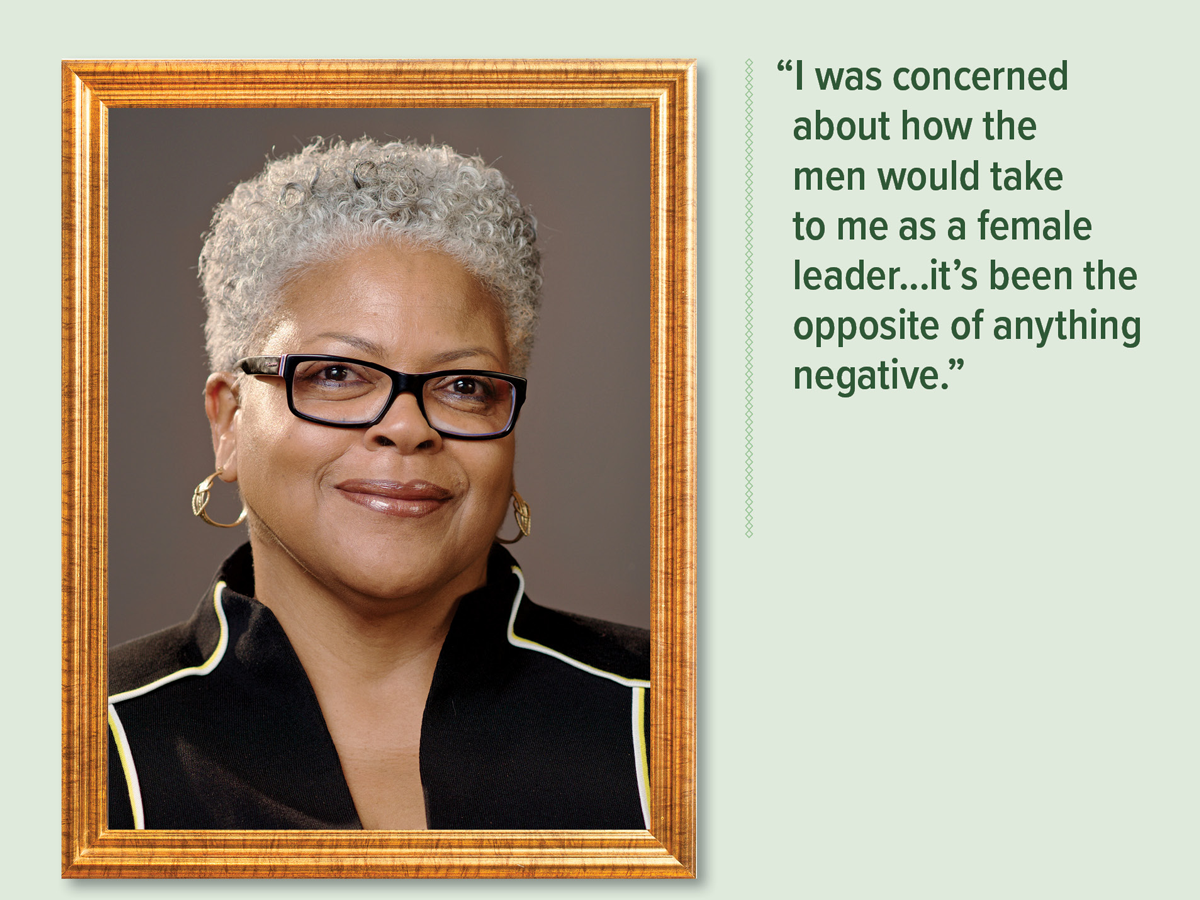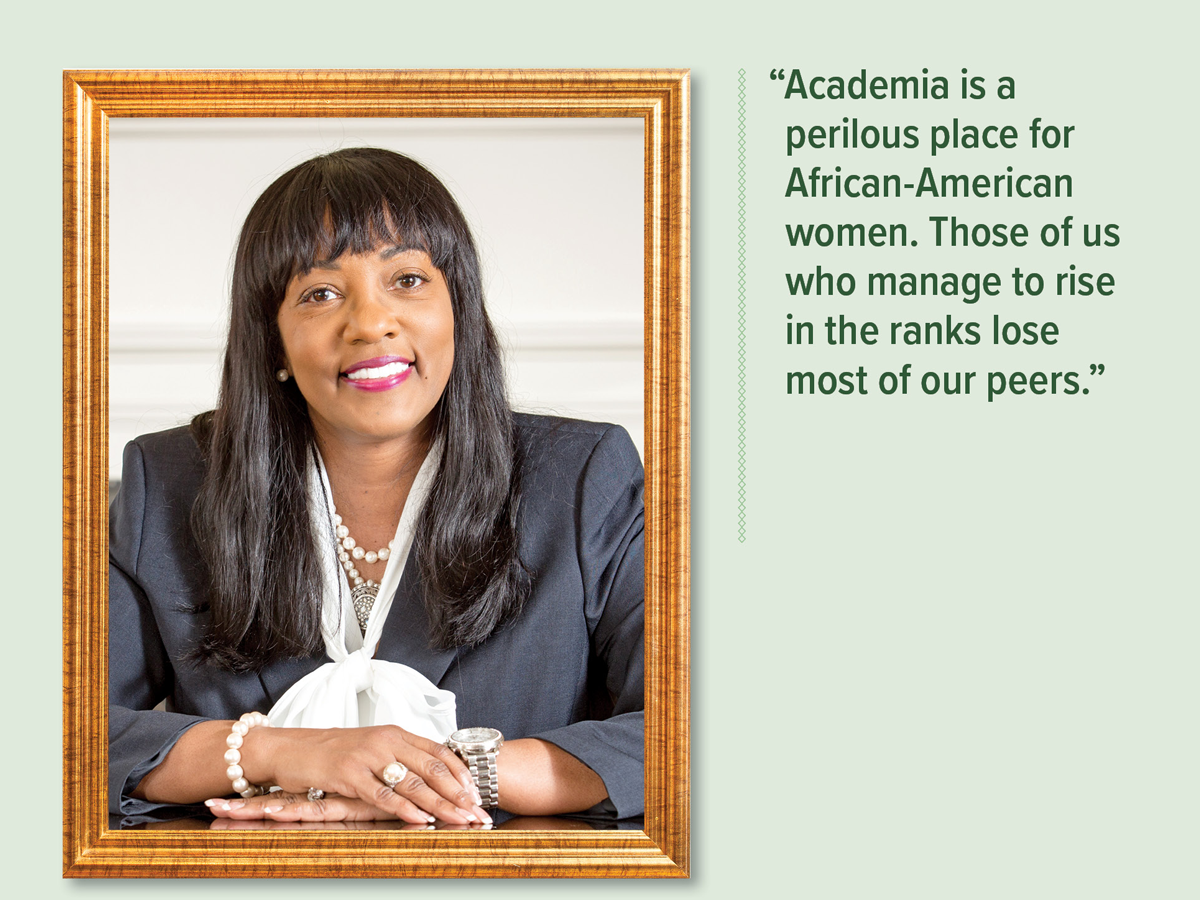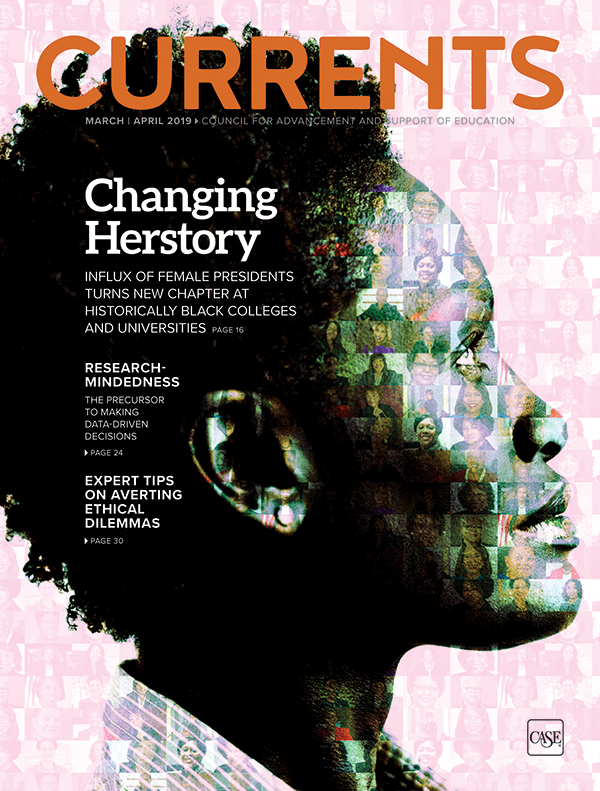
Changing Herstory
Back in 2014, Alabama State University recruited Gwen Boyd, a black woman and highly regarded mechanical engineer, to become president.
But one part of Boyd's contract drew national attention: She could not have "lovers" stay over at her home for an extended period of time.
Boyd, now president and chair of the alumni branch of a black engineers' group, did not dispute the clause. Still, the revelation opened up debates across the country that had more to do with a new cadre of women stepping into the leadership of historically black colleges and universities than the personal life of Boyd, ASU's first female president. Some questioned whether an incoming male president would be given the same directive.
As a growing number of women lead America's HBCUs—many of them praised for creating new partnerships or wrangling financially troubled institutions back from possible dissolution—their presence is forcing conversations related to gender equality in academia. It also is stirring up a conversation about the sometimes-challenging environments in which they must succeed.
"On a number of these issues, it's because of our very conservative moral religious perspective," Johnny C. Taylor Jr., chair of the (U.S.) President's Board of Advisers on Historically Black Colleges and Universities, said of black Americans. "It's absolutely true that we're more conservative and specifically have seen that with women's issues."
This dynamic is one of those at the heart of the hurdles that female leaders face when they take on the presidencies of HBCUs. Right now, 25 women are presidents of the nation's 100 HBCUs, according to the Thurgood Marshall College Fund and the United Negro College Fund. That figure is a trickle behind the 30 percent of college presidents that were women in 2016, according to a 2017 survey by the American Council on Education. HBCU advocates say the number of black female HBCU presidents should be much higher given that females make up between 62 percent and 75 percent of HBCU student bodies, depending on the source. But Taylor points out female HBCU presidents numbered only 10 just a few years ago, so the trend is still toward improvement.
Whatever the case, women leading HBCUs are at the center of national conversations as they navigate a world they say is not for the faint of heart. There are no programs to support them, but for now, they are speaking out for the need for mentors. As mathematicians, psychologists, biologists, they are not intellectual lightweights and they've had to walk this road by themselves.

Aminta Breaux, president of Bowie State University
Mentors Key to Success, But in Short Supply
In many cases, these women are inheriting financially ailing institutions and accomplishing the impossible. Phyllis Worthy Dawkins, president of Bennett College, is working an aggressive campaign to secure donations to boost the college's standing in the face of possibly losing its accreditation due to concerns about finances. Fundraising overall at the Greensboro, N.C., school has improved under Dawkins' leadership and donors ranging from alumni to Hollywood stars are joining her campaign. Debra Saunders-White, who died in 2016, increased partnerships at North Carolina Central University and spearheaded the opening of a new business school as the Durham, N.C., HBCU's first woman chancellor—all while undergoing chemotherapy for kidney cancer.
Still, these pioneering females say their jobs are fulfilling. Even with the unique challenges, they say, they find the work rewarding.
Aminta Breaux became the first woman president of the HBCU Bowie State University in July 2017, coming from Millersville University, a former teacher's college in Pennsylvania, where she was vice president for advancement. Like her counterparts at other schools, she arrived at the suburban Maryland campus with solid credentials. She works with Taylor as an appointee to the President's Board of Advisers on Historically Black Colleges and Universities, and in October 2017, The National Council of Negro Women recognized her as its Educator of the Year.
Since taking over at Bowie State, she has been credited with driving up enrollment and has talked of timely innovations that resonate with the public, such as business incubators and campus entrepreneurial communities.
Breaux's role at Bowie State marks a return to HBCU life. She spent a year at Lincoln University in Pennsylvania before transferring to Temple University, where she earned bachelor's and master's degrees before earning another master's at the University of Pennsylvania. She says she feels a sense of belonging at Bowie State, where everyone on campus says hello to one another as they walk through campus.
Make no mistake, however, that comfort factor does not mean the road is smooth, she said.
"If you're in a leadership role, if you're too strong, there are some folks who will [describe you in an] unfavorable [way] because you are strong," Breaux said. "If you're too forceful ... the negative perceptions that people have [are that] you're rigid, you're mean, so there are different ways that women are viewed. If you are weak or perceived to be weak, then people are going to try to take advantage. It's always a balancing act for a woman leader."
Many women contend with impostor syndrome, a phenomenon in which an accomplished woman doubts herself and fears being exposed as a fraud, Breaux said. Even former First Lady Michelle Obama writes of feeling this way in her 2018 autobiography, Becoming.
Because of this, Breaux says, women HBCU presidents need mentors. She says her mentors have been men and women of varying races, and all have helped her.
"Who's going to tell you as a women president, you have to keep an extra pair of shoes underneath your desk?" Breaux said. "Male mentors will tell you that you need to take up golf. One of the reasons I took up golf is that a male mentor told me a lot of business takes place on the golf course."
Bowie State is benefiting from the mentorship model, Breaux said, by participating in the American Council on Education Fellows Program. Through this, Kimetta Hairston, an education professor at Bowie State, is spending the 2018-2019 academic year shadowing Makolah Abdullah, president of Virginia State University in Petersburg. When Hairston returns, the campus will be able to draw up a meaningful recommendation on how other women can approach college presidencies, Breaux said.
Mentoring is about "establishing relationships with people who are going to help you find that way forward," she said.

Brenda Allen, president of Lincoln University
A Student Returns to Her Alma Mater as President
Brenda Allen saw all sides of the fence in academia before returning to her alma mater, Pennsylvania's Lincoln University, in July 2017 to become president.
Allen found her years at Yale University in New Haven, Conn., where she was postdoctoral fellow and postdoctoral associate, to be "very isolating" because there were so few black people on campus. Smith College in Northampton, Mass., actively recruited her and gave her lots of support, including a mentor, which helped make her stay there comfortable, she said. She chaired Smith's African American studies department and was special assistant to the provost. Allen also had a mentor at Brown University in Providence, R.I., where she served as associate provost and director of institutional diversity.
The New Jersey native found that moving from her northern academic experiences to Winston-Salem State University in North Carolina to become provost in 2009 was educational. She came to see that the norm in such positions was to be male, married, heterosexual, and Baptist, she said.
"I've never been married, not ever going to be a size 2, and I'm not docile," Allen said. "I was successful as a provost but was not invited to a second interview as chancellor. When it came time to pick a new chancellor, where people thought I was the heir apparent, that didn't happen."
Then came the opportunity at Lincoln, a storied school about 25 miles west of Wilmington, Del., that has graduated the likes of writer Langston Hughes, late Supreme Court Justice Thurgood Marshall, and Kwame Nkrumah, the first president of then-newly independent Ghana in West Africa.
"My relationship with Lincoln is a bit different than any of the other schools," Allen said. "My reception has been nothing but positive. I'm an alumna. I'm coming in after some really antagonistic leadership changes—president, board, and so on. I have to say when I walked in, I was concerned about how the men, the older alumni who were students here when it was an all-male institution (women first received degrees in 1953), would take to me as a female leader and an alumna and it's been the opposite of anything negative."
After a lifetime of experiences at various institutions, though, Allen can say that there seems to be a heavier scrutiny of black women in leading roles at institutions of higher learning. In fact, a Nov. 2016 post on Medium noted that black male HBCU presidents tended to be forgiven when they tripped up in the job, but black female leaders were asked to resign.
It is important for black women to get past the scrutiny and lead because a large proportion of HBCU students are female, Allen said. The National Center for Education Statistics says the 2016 figure is about 62 percent, while presidents and advocates in the HBCU space say current figures are closer to 70 to 75 percent.
"We are being educated in larger numbers," Allen said. "I think historically that women have not been in top leadership at HBCUs, but now that they are, they come with less of the traditional culture...I think we bring perspective that has just not been dominant."

Andrea Lewis Miller, president of LeMoyne-Owen College
Resistance in Unexpected Places
Andrea Lewis Miller, a cell and developmental biologist, spent 20 years in academia in Louisiana and Nevada before becoming president at LeMoyne-Owen College in Memphis in 2015. While there, she successfully convinced a donor of the need to build her leadership team by adding six new executives. Miller has experienced resistance and questioning, but from quarters that she didn't expect.
"I wonder sometimes if a man would receive the same type and degree of resistance," Miller said. "I am certain that male presidents don't have to manage the condescension that I do. What has surprised me time and again are the challenges presented by women. Women leaders expect the difficulties that arise from men, but the roadblocks from women always stun me."
Lewis said she is fortunate to have taken the lead at a stable school not facing financial crisis, but even leading through change can be stressful.
"Change can be destabilizing and create mini-crises for individuals and functional areas within the college," Lewis said.
"Supporting people through change is far more complex than most people might imagine, especially if they have never led an organization. The wear on your body, mind, and spirit could be detrimental, which is why I rely on a very strong faith in God to maintain me. My team tells me I should also rely on some good self-care practices."
She did not know quite how to answer a question about what sorts of efforts should be put in place to support women HBCU presidents.
"I know there are pipeline programs for higher education leadership, and I know there are academies for new presidents, but I don't know of any recent or regular efforts focused specifically on preparing leaders for the HBCU presidency or supporting new HBCU presidents," Lewis said.
"The idea of considering a pipeline for female HBCU leadership might be revolutionary," she continued. "Is it odd that this question has stumped me?"
Lewis did say, however, that any effort to support female HBCU leaders will have to be focused and aggressive if it is to work.
"Academia is a perilous place for African-American women," she said. "Those of us who gain tenure and manage to rise in the ranks lose most of our peers along the way to cultures that are hostile to us. Getting to equity in HBCU presidencies will require a fundamental shift in higher education, broadly speaking."
Those working in the HBCU space have lots of ideas for how society can help turn the corner.
Publicly funded schools are doing a bit better than those that are privately funded when it comes to supporting female leaders, Payne of the Thurgood Marshall College Fund said.
Breaux agreed and noted that women are heading up all three of the state-run HBCUs in Maryland. She suggested that the HBCU community view state schools as a model.
Wage and compensation packages for women HBCU leaders also do not match those of their male counterparts, Payne said, and that needs to be addressed.
According to an analysis of HBCU presidential salaries drawn from data collected by the U.S. Department of Education and surveys by the Chronicle of Higher Education, only Beverly Tatum and Mary Schmidt Campbell, respectively the former and current presidents of Spelman College in Atlanta, Georgia, made the list of highest paid leaders of private HBCUs in 2016-2017, the latest data available. At public HBCUs, only Glenda Baskin Glover of Tennessee State University, Elmira Mangum, former president of Florida A&M University, and Carolyn Meyers, former president of Jackson State University in Mississippi, made the list of highest paid presidents.
Support Systems to Retain Talent
But providing fair compensation to women HBCU presidents is not the only issue, Taylor said. There's also the question of making sure they have the support to keep them there, an issue tied to the mentorship focus that Breaux and Allen point out.
"You've got this problem of retention," Taylor said. "Retention is making sure [women leaders] feel included when they're there, feeling as if they're not held to a different standard, and secondly—to the extent they request—support like executive coaching to be successful in their roles."
Taylor stressed that it's important to note that not every female HBCU president needs coaching, but that it should be made available.
"When we promote a woman and that woman says, ‘yes'—this is a good old boy's world—we need to be clear to offer it up recognizing historical realities," he said. "They are operating in an environment that is not typically used to having women in leadership roles, so there is some level setting, some cultural interventions that are going to be necessary for the entire organization."
Brian Bridges, vice president of research and member engagement at the Washington-based United Negro College Fund, is not convinced that gender is an issue among HBCU presidents. "The fact is there are ineffective presidents of both genders," he said.
Bridges also said he's only seen anecdotal evidence toward the theory that women HBCU students want women leaders as role models. But Bridges does say that UNCF is looking at potentially creating some sort of mentorship program among UNCF, effective HBCU presidents, and incoming presidents.
The growing pains are natural, said N. Joyce Payne, founder of the Washington, D.C.-based Thurgood Marshall College Fund, a support organization for the black college community. "Women [at HBCUs] are probably going through the same transition that we see in corporate America," she said.
"I think we're looking at some very positive developments in the corporate world," Payne added. "At the same time, we know women are still facing the historic barriers, gender equity."
Women in HBCU leadership are reticent to take risks and do not have the support they need, Payne said. As a result, many do not make the natural jump from high position to highest position, she said.
"I maintain we have some exceptional women in leadership positions—vice president for academic affairs and student affairs—who simply refuse to take that leap [to president] unless they were 150 percent confident," Payne said.
"It's also a lonely position for women," she said. "They don't have the support group to surround them with the kind of encouragement and intervention that they need. I think what we face in higher education is pretty much what women are facing in a larger society."
Payne believes that Congress, with its cadre of new female leaders, will help change things. People who care must also prod HBCUs to enforce change and make sure it is concrete action, and not just words.
In the meantime, the few—but growing—number of women who have broken through the glass ceiling at HBCUs advise other women aspiring to the presidency to have their acts together.
"It could be because I'm a woman, because I'm a black woman, could be because I'm black, I don't know. But I do feel that I've had to prove myself everywhere that I've been, and once I'm able to do that, then doors open," Allen of Lincoln University said.
"You just have to be yourself," Breaux of Bowie State advises. "You can be a strong leader, you can be compassionate, and you can be successful just being who you are."
The Story of Historically Black Colleges and Universities
Before the Civil War, there were few institutions of higher education in the United States that would serve black Americans. After the end of the war in 1865, a number of schools cropped up to educate the newly freed black Americans. Those schools were assisted by black churches, missionary organizations and the Freedmen’s Bureau, an agency established by Congress to help former slaves and poor whites establish themselves after the war.
Today, historically black colleges and universities, or HBCUs, range from a few hundred students to more than 11,000, and they are mostly concentrated in the South. They cater predominantly to black students but 17 percent of the students are represented by other cultures.
According to the White House Initiative on Historically Black Colleges and Universities, the Higher Education Act of 1965 defines an HBCU as: “…any historically black college or university that was established prior to 1964, whose principal mission was, and is, the education of black Americans, and that is accredited by a nationally recognized accrediting agency or association determined by the Secretary (of Education) to be a reliable authority as to the quality of training offered or is, according to such an agency or association, making reasonable progress toward accreditation.”
Related CASE Conferences
Strategic Talent Management
Chicago, Ill. • March 6-8, 2019
As talent management grows as a vital function in our industry, leveraging available resources to provide the multiple services of a full-fledged program has become a critical challenge needing a strategic answer. Organizations big and small are trying to find what fits.
Diverse Philanthropy and Leadership
Indianapolis, Ind. • April 15-17, 2019
As the nation's demographics continue to shift toward a new minority-majority, organizations are experiencing a transformation: donors and constituents are becoming more diverse. As we look toward the future of our organizations, it is vital that we are inclusive and create unique experiences to attract the diversity of the communities we serve.
Fast Facts on HBCUs
The oldest HBCU is Cheyney University of Pennsylvania, located in Cheyney. The school was founded in 1837 in Philadelphia as the African Institute and in 1852 became the Institute of Colored Youth. It was founded by Richard Humphreys, a Quaker philanthropist from the West Indies who'd moved to Philadelphia in the 1700s. In the early 1900s, the school purchased property in Cheyney, 25 miles west of Philadelphia, from Quaker George Cheyney. The school's initial focus was to create teachers who would go on to teach others.
HBCUs represent 3 percent of colleges and universities in the United States.
Enrollment has increased at HBCUs from 223,000 in 1976 to about 300,000 today.
There are 100 HBCUs in the United States and the U.S. Virgin Islands, about the same as in 1980, but down from 121 in the 1930s. After the Supreme Court rejected the "separate but equal" doctrine in the landmark 1954 Brown v. Board of Education case many public HBCUs either closed or merged with traditionally white institutions.
In 2015, 17 percent of HBCU students were non-black.
Some prominent HBCU graduates:
Martin Luther King Jr., civil rights leader, bachelor's degree from Morehouse College in Atlanta
Toni Morrison, Nobel Prize-winning author, bachelor's degree from Howard University in Washington, D.C.
Spike Lee, filmmaker, bachelor's degree from Morehouse College
Katherine Johnson, mathematician and computer scientist whose story was featured in the movie Hidden Figures, bachelor's degree from West Virginia State University in Institute
Thurgood Marshall, first black U.S. Supreme Court justice, bachelor's degree from Lincoln University near Oxford, Penn., law degree from Howard University
About the author(s)
Melanie Eversley has written for USA Today, the Atlanta-Journal Constitution, Diverse Issues in Higher Education, and more.
Tags
Article appears in:

March - April 2019
Changing herstory: Female presidents are writing new chapters at historically black institutions. Plus, the key to making data-driven decisions and expert tips to avert legal issues.